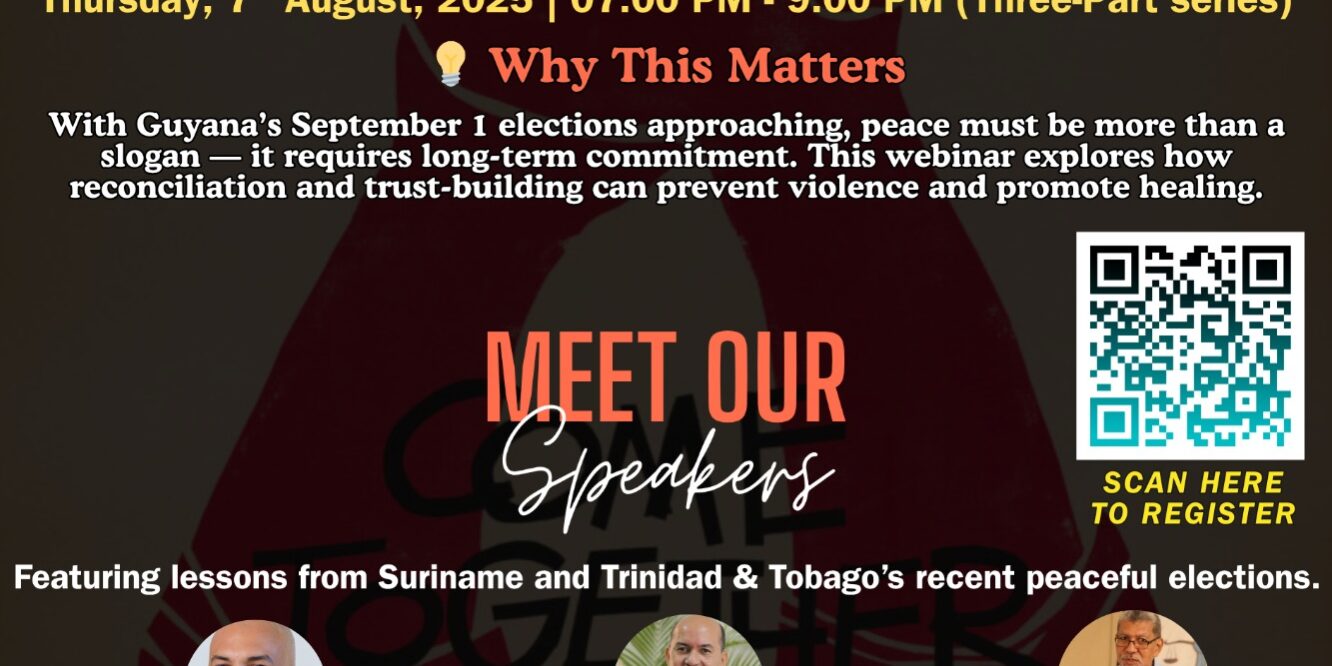As Guyana approaches its crucial September 1 elections, a new civil society initiative backed by the Roman Catholic Church is urging the nation to look beyond election day and address the deeper causes of electoral tension and violence.
The Just Electoral Peace initiative, launching in August, will bring together political stakeholders, civil society leaders, and the wider public for a three-part webinar series focused on trust, system strengthening, and shared national values. The online dialogue begins August 7 and runs until August 21 . (See flyer below for dates and time)
The goal: to create safe spaces for Guyanese citizens and leaders to confront hard questions about reconciliation, constitutional reform, and trust in electoral systems — issues that, if left unaddressed, risk fueling the tensions that often erupt before and after elections.
“Every election cycle we see a flurry of voter education drives, calls for peace, and signed codes of conduct — but between elections, the longer-term work too often stalls,” said Lawrence Lachmansingh, one of the initiative’s coordinators and moderator of the first webinar. “This effort is about reawakening a sense of collective responsibility for the deep, hard work that must continue after September 1.”
The initiative draws inspiration from the lessons of 2020, when post-election violence, including the tragic murders of Joel and Isaiah Henry, shocked the nation. In the aftermath, civil society groups — supported by the UN — crafted a framework to analyse and address the root causes of electoral conflict. That framework shapes the webinar topics today.
A Blueprint for Peace
The webinars will tackle three urgent questions:
- Reconciliation and Trust: How can Guyana heal past wounds and build the trust needed to prevent old grievances from driving new violence?
- System Strengthening: What reforms are needed to ensure electoral systems are credible, effective, and free of flaws that can breed conflict?
- Rights and Values: How can citizens and leaders strengthen a shared understanding of constitutional values that encourage peaceful political engagement?
Organisers say this is only the beginning. The webinars are the first step in a longer-term commitment to dialogue and action through 2030, aimed at removing the root causes of electoral conflict and encouraging the peaceful acceptance of election results.
Church Support for Dialogue
The Roman Catholic Church in Guyana is lending its institutional support to the initiative, inspired by Pope Francis’ encyclical Fratelli Tutti, which calls for greater global use of dialogue to address political and social conflict.
“The Church stands ready to help build bridges where divisions exist,” said Bishop Francis Alleyne, who is part of the working group alongside Dr. David Singh, Lawrence Lachmansingh, Sara Bharrat, and Vanessa Williams.
With tensions expected to run high during the campaign and after election day, organisers say the time for conversation is now — and they hope to encourage the broader public to join in, listen, and share ideas for a peaceful future.
Register here: https://forms.gle/dGWv46PVwV2V9CnS9
Send an email here: aecrccommunications@gmail.com








